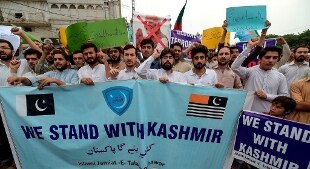- India abolishes the constitutional autonomy of Kashmir, a protest from Pakistan
- Terrorism alert in Kashmir, 20,000 tourists evacuated
Share
07 August 2019There is no sign of easing the tension between India and Pakistan, which began following the decision by New Delhi to revoke the special status of the Kashmir region "due to the danger of terrorism". Islamabad has announced, at this time, first the suspension of trade relations with India, then the decision to expel the Indian diplomatic envoy to the country and to recall the Pakistani ambassador to New Delhi.
"Our ambassadors will no longer be in New Delhi and even their counterparts here will be sent back," Foreign Minister Shah Mahmood Qureshi said, speaking to the Ary News television channel, according to local media reports. Meanwhile, hundreds of politicians are arrested in Kashmir.
Hundreds of politicians under arrest in Kashmir
Over one hundred members of various political parties and Kashmiri activists are under arrest in the Kashmir valley. The Hindu newspaper writes on its online site that the news comes from a local administration official, who gave no further information on the identity of all those arrested. Former state governor Mehbooba Mufti and Omar Abdullah, under house arrest from Sunday night, would be transferred on Monday night, along with Sajjad Lone and Imran Ansari, the two leaders of the Jammu and Kashmir People's Conference party, in the Hari Niwas palace, a historic residence in the heart of the capital. The arrest warrant against them, writes The Hindu, was signed by local magistrates to prevent possible initiatives "to disturb peace and tranquility in the Kashmir Valley.
Since the government's announcement, Monday morning, of the cancellation of the autonomy of the state of Kashmir, which was guaranteed since 1947 by the Indian Constitution and confirmed by a UN resolution of 1948, the whole valley is isolated from the rest of the country, with all suspended communications, except satellite ones; a strict curfew paralyzes daily life for two days, with public offices, schools and closed hospitals, private activities are suspended, while tens of thousands of special security forces are patrolling every corner.

